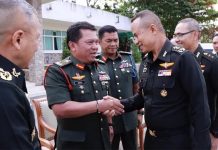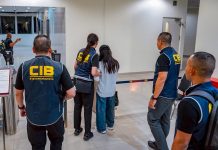SI SA KET, July 17 – Thai border patrol police are prepared to replace soldiers at the contested area between Thailand and Cambodia around the Preah Vihear temple after both countries agreed to withdraw their troops from Wednesday.
Four companies of Thai border patrol police from several northeastern provinces including Ubon Ratchathani, Udon Thani and Sakon Nakhon were now on standby at the border patrol police camp in Si Sa Ket, awaiting to take shift from the army tomorrow.
Ubon Ratchathani border control police commander Pol Col Sunthorn Praditthaen said all police are in their full capacity to protect the border and have been instructed to strictly follow the discipline in order to maintain good ties between the two neighbours.
Col Sunthorn said he and a group of border patrol police will survey the area today to familiarise themselves with it before replacing the troops.
Bangkok and Phnom Penh announced last week that they would reduce their troop contingents at the disputed border under the International Court of Justice (ICJ) order.
Cambodian Foreign Minister Hor Namhong said Cambodia will withdraw some 486 military personnel from Provisional Demilitarized Zone (PDZ) surrounding the Preah Vihear Temple tomorrow in order to comply with the ICJ order.
Thai Foreign Minister Surapong Tovichakchaikul later said Thailand will draft the Terms of Reference (ToR) for ASEAN observers to access the area.
In April 2011 Cambodia asked the ICJ to clarify and interpret its 1962 ruling on Preah Vihear.
The court ruled in 1962 that the ancient Hindu temple belonged to Cambodia but did not define the boundaries of the area surrounding the structure, which has led to sporadic clashes between troops of both sides since then.
The court last July ordered both Thailand and Cambodia to immediately withdraw their military personnel present in the PDZ and have no military presence in the zone, and urged both countries to work with ASEAN to reach an agreement allowing the regional bloc’s observers to enter the disputed zone.
The two countries were also ordered to revive their stalled talks to resolve the conflicts. Both must report developments to the court until a decision on Cambodia’s main request for interpretation of the 1962 order is finalised.




